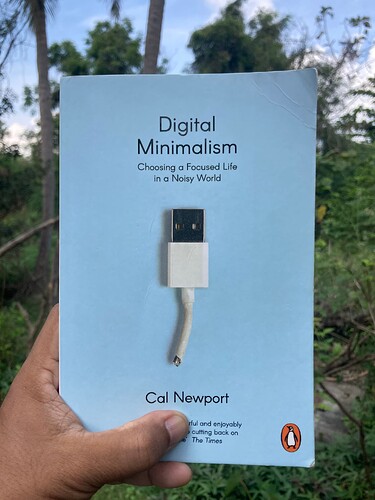Digital Minimalism, Cal Newport, 2019 – I was very concerned about my Twitter usage so read this book a few months back. It is quite useful and has reduced my mindless scrolling dramatically as I now pursue it with intention for limited time. The idea behind the book though isn’t new. It is one of those things most of us know but can’t do. Deliberate practice can only come with intention so I recommend reading this book. Acknowledging that you have a problem (if you do) is the first step towards digital declutter and digital minimalism.
My notes –
-
The urge to check twitter or other social media shatters time into small useless fragments for focused work
-
Endless stream of information has made us into (mostly useless) information addicts
-
Being connected to friends on facebook renders us useless in maintaining F2F conversations
-
Portrayals of perfect lives of SM leads to lives lived with feelings of inadequacy
-
Online discussions lead to emotionally charged and draining extremes.
-
Darker emotions attract eyeballs than positive and constructive thoughts in attention marketplace
-
A moment can feel strangely flat if it exists solely in itself (A moment not shared on SM)
-
We have been coerced to use screens more than it is healthy – billions have been invested to make this outcome inevitable
-
Checking your “likes” is the new smoking (Philip Morris just wanted your lungs, the screen wants your soul)
-
Every time you check your phone you are playing a slot machine to see “What did I get?”
-
Addiction – substance or behavior that provides reward despite detrimental consequences. Behavioral addictions (pathological gambling and internet addiction) resemble substance abuse
-
Tech companies engage in intermittent positive reinforcement / variable rewards (unpredictable rewards release more dopamine) and the drive for social approval (Every SM post is a gamble for likes or RTs)
-
Paleolithic man needed a carefully cultivated social standing and approval as his survival depended on it. Behavioral addictions have hijacked this primitive behavior for approval / survival
-
Paleolithic brain equates not reading a newly arrived notification as snubbing a tribe member
-
Digital declutter – step away from optional (what won’t disrupt your daily personal and professional life when removed) online activities for 30 days and cultivate high-quality leisure (long-term meaning over short-term satisfaction)
-
Digital minimalism – Focus your online time on small number of carefully selected and optimized activities that strongly support things you value and happily miss out on everything else
-
Post digital declutter, be intentional about what technologies you choose to use (only what you deeply value) and have a specific time in which to use them (once a day for 10 mins for eg.)
-
Thoreau’s new economics (read Walden if you haven’t yet) – shifting unit of measure from money to time. If ploughing 1 field gives you $1 and ploughing 60 gives $60, standard economic theory would urge you to maximise – Thoreau on the other hand asks if the effort is worth it physically, mentally (cost in life required to achieve it) and if the better blinds on the window you can buy with the profits is really worth it
-
Standard economic theory would say Twitter is good for the occasional real benefit you might achieve but Thoreau’s new economics would measure that profit against “your life” (the cost)
-
The cumulative cost of the noncrucial things we clutter our lives with can far outweigh the small benefits each individual piece of clutter promises (law of diminishing returns)
-
Compulsive phone use papers over a void created by the lack of a well-developed leisure life
-
Solitude is an agreeable refreshment to the busy mind – Benjamin Franklin (Cultivate solitude – lose loneliness in solitude, generate new ideas and a better understanding of self in solitude)
-
We have a great haste to construct a magnetic telegraph from Maine to Texas, but Maine and Texas, it may be, have nothing important to communicate (Thoreau)
-
Avg. smartphone user spends 3 hours a day using it – while picking it up 40 times per day!
-
Solitude has been banished from daily experience with the smart phone
-
The idea that its valuable to maintain vast number of weak-tie social connections (followers) is largely an invention of the past decade
-
Prioritize demanding activity (learn new skills) over passive consumption (cultivating high-quality leisure)
-
Use skills to produce valuable things in the physical world (leave good evidence of yourself)
The book should have been a blog and doesn’t deserve to be 240 pages long. A lot of it is repetitive but if your idea is to fix yourself, its ignorable. It is filled with actionable ideas on cultivating high-quality leisure (meeting friends, building things, picking up new skills – carpentry, guitar what not) and on how to approach digital minimalism in the initial 2-3 chapters. It will force you to think through how you spend your time on a daily/weekly basis. 8/10
| Subscribe To Our Free Newsletter |


